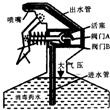问题
问答题
为了预防“非典”,小宇的妈妈买回一个消毒用的手执喷雾器,图中是手执喷雾器的结构示意图,请你写出这种喷雾器在工作过程中,应用到哪些物理知识?

答案
(1)手压压柄部分,压杆和出水管接触的部分为支点,构成一个杠杆;
(2)压杆下面有弹簧,按动压杆时,弹簧压缩形变,产生了弹力;
(3)按动压杆,活塞向右运动,导致进水管内气压减小,在大气压作用下把消毒药水压进进水管内;
(4)弹簧受到挤压后会把动能转化为弹性势能.
